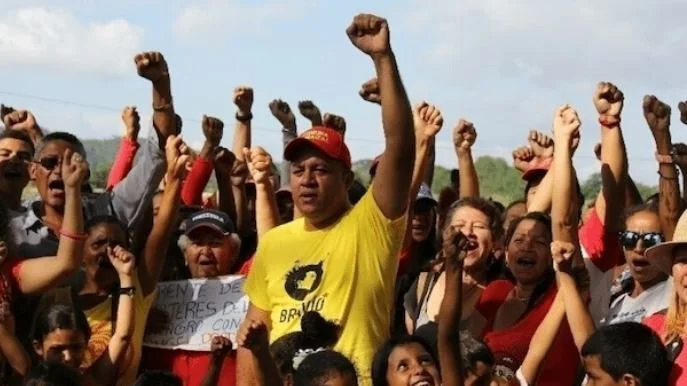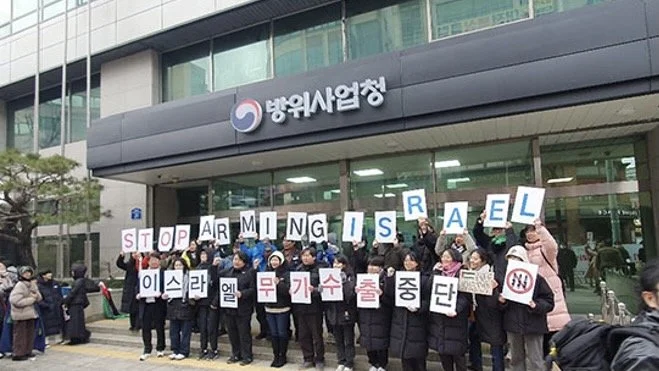US recruits South Korea to help colonize and militarize space
If the conference launched the fight against the Yoon administration’s militarization of space, it also remained connected to frontline struggles against militarization in South Korea, the United States’s first line of attack against China. In particular, presenters spoke about the construction of airports with dual military functions. Kim Yeon-tae president of the People’s Action to Nullify The New Saemangeum Airport, noted the absurdity of spending over 40 trillion won ($30 billion) to build 10 more airports in an area as small as South Korea, where 11 out of 15 airports are running at a loss. Constructing new airports only made sense when taking into account their dual military use. More specifically, Saemangeum International Airport—right across from China and connected to the US Kunsan Air Force Base—would allow the Air Force Base to launch more jets. Soon-ae Kim, chair of the Operating Committee of Jeju’s Green Party, explained how building a second airport on the island as well as prospects of its military use violate Jeju’s official designation as an island of peace.
Conference speakers and attendees made clear that their movement was rooted in frontline struggles against profiteering from human and environmental destruction and that it would continue. Yong-woon Hwang, a journalist and activist against the Jeju Naval Base, proposed building public awareness around AI and the militarization of space through the annual Whistler Film Festival. Ultimately, the activists gathered to build a better world we can live in and leave behind for our children.
Read More
Persons with Disabilities in Korea Still Fighting Against Discrimination - Reflection on the International Day of Pers
December 3, 2024 marks the 32nd International Day of Persons with Disabilities, which was officially designated in 1992 to commemorate the adoption of the global disability action plan by the 37th United Nations General Assembly (December 3, 1982). 31 years ago, the first International Day of Persons with Disabilities began with people with disabilities all around the world seizing the microphone from politicians on the stage and trying to make their voices heard. It was meant to reproach politicians for having looked the other way in relation to the rights of the disabled and to resist widespread attitudes embodying mere pity taking.
On December 3, 2024, the Korean disability movement will have a 2-day long protest. December is a crucial political month in Korea because this is customarily when important discussions around the government budget and legislation happen. They call for the enactment of seven disability rights laws (Act on Guarantee of Rights of Persons with Disabilities, Act on Promotion of the Transportation Convenience of Mobility Disadvantaged Persons, Special Act on Supporting Jobs Focusing on Disability Rights, Act on Persons with Developmental Disabilities, Act on Guarantee of Rights of Independent Life of Persons with Disabilities, Act on Life-long Learning of Persons with Disabilities, Act on Special Education) to achieve institutional changes, and demand a commensurate budget for those laws to ensure their full implementation.
Read More
On the Political Mentality in the U.S. and the Alienation of American Voters
As the American presidential elections approach, it is timely to deepen our reflection on the political landscape of the United States, understand the predominant mindset among Americans, and analyze recurring patterns in local political thought. Three major ideological currents stand out in America: social conservatives, fiscal conservatives, and liberals. Of these three, the latter warrant closer scrutiny as they are frequently mistaken for progressives or leftists. Yet, addressing humanity's crises requires correcting this misconception. True progress necessitates a break from the frameworks of capitalism and imperialism, which liberals refuse to do.
Read More
Free Free Palestine!
The only way to stop the ongoing genocide is for the citizens of the world to stand together in solidarity and fight for Palestinian freedom, and this is an important task for all those who stand in solidarity with Palestine.
We are approaching the one-year anniversary of the Israeli offensive that devastated Gaza. Civil society in South Korea is also planning a national action on October 5. Let's work together to end the colonization and liberation of Palestine, for freedom and justice in Palestine, and for the future of Palestinian children.
Read More
A Month long controversy over the Venezuela's presidential election
The writer traveled to Venezuela from July 23-29 as an international observer for the presidential election. The writer received an overview of the election process and visited five polling stations in Caracas to observe the voting process in person. Voting was taking place in a free and peaceful environment. After the election, the writer participated in the announcement of the results and witnessed the Venezuelan people gathered in front of the Presidential Palace in Caracas to celebrate the results. The writer also saw the violent protests that took place in Caracas the day after the election.
On July 28, Venezuela's presidential election was held, and the National Electoral Council (CNE) announced that total voter turnout was 59%, with President Nicolas Maduro receiving 51.95% of the vote (6.4 million votes) and Edmundo Gonzalez receiving 43.18% (5.3 million votes) of the nine opposition candidates. As a result, incumbent President Nicolas Maduro will begin his third term in January 2025. However, the results of Venezuela's presidential election have been under debate for a month now, both within the country and around the world.
Read More
Why Venezuela's Presidential Election Matters
Venezuela is currently undergoing a revolution that challenges the U.S. unipolar order in favor of a multipolar world. Despite facing issues like corruption and economic difficulties, the Bolivarian Revolution—a 25-year-old initiative of direct democracy that empowers the people—has bolstered communes and continues to secure basic human needs through social programs, including free healthcare and housing missions.
Moreover, the Bolivarian process encourages regional cooperation in Latin America. The Bolivarian Alliance for the Peoples of Our America—The People's Trade Treaty (ALBA-TCP) remains committed to promoting trade and cooperation based on solidarity. This commitment explains why the majority of Venezuelans have supported the current government for 25 years and why Latin American and Caribbean nations stand in solidarity with Venezuela.
As South Korea strengthens its alliance with the U.S., Venezuelan news is often reported through the lens of mainstream Western media. For instance, the media labels Nicolas Maduro as a “dictator” simply because he is serving his third term. Nonetheless, it is crucial to observe the Bolivarian Revolution as it continues to foster direct democracy, social programs ensuring basic needs, and solidarity-based trade. These efforts symbolize hope for a society distinct from one dominated by capitalism, which exacerbates the wealth gap, views basic needs as individual burdens, and disregards the people's will in politics. I am writing from Venezuela, serving as an international observer for the presidential election, and I am keenly anticipating the results on Sunday (July 28).
Read More
Capitalism’s Burnout and Depression
This striving to be the best intensifies when you mix the West’s hyper-individualism–leading to societies that become free-for-alls. Individuals become obsessed with self-recognition and recognition from others in our Achievement Society which values titles, awards, and status. According to Han, the same obsession with increasing one’s “worth” is how positive power drives us to self-exploit into depression and burnout. Han particularly emphasizes that “freedom itself, which is supposed to be the opposite of constraint, is producing coercion”. When you combine the self-monitoring of positive power with capitalism’s "unlimited potential" ideology, you essentially self-exploit to achieve your goals. Symbolically, a pair of eyeballs that invade your psyche for productivity is bound to lead to burnout, shame, or depression. The inevitable “shortcomings” or “failures” will undermine your “value” or belief in accomplishing the impossible.
Credit: Lee Nallalingham
When this incessant push for achievement and success becomes too much, individuals burn out and fizzle into depression. Understandably, nearly half (48%) of 18-to-29-year-olds said they feel drained compared with 40% of their peers aged 30 and up, while women (46%) reported higher levels of burnout than men (37%). To fail in this Achievement Society or otherwise not prosper is to “see themselves as responsible for their (shortcomings) and feel shame instead of questioning society or the system”. Because we operate as individual “projects” to be constantly improved upon, the self-exploitation of positive power turns our aggression against ourselves– leaving many of us inclined towards depression rather than demands for a social project for real change.
Read More
Globalize the Struggle, Globalize Hope
Nearly 200 years after Marx called for “workers of the world to unite,” internationalism is still a secondary priority for most of the left, rarely moving beyond handshakes between trade union leaders or statements by progressive parties. It’s ironic then that peasants, a class often denigrated as provincial and backward, have built the most successful international movement of the 21st century. La Via Campesina or “The Peasant Way'' started as a declaration by 31 peasant organizations and has now grown to 182 national affiliates and 200 million members. In her book, “La Via Campesina: Globalization and the Power of Peasants,” Annette Aurelie Desmarais reveals peasant activists used international solidarity to fortify—rather than detract from—local and national struggles.
Read More
How far has the militarization of space progressed?
As of April 2023, 18,997 pieces of space debris orbit the Earth. This debris includes spent rocket stages, defunct satellites, and other fragments from various space activities. The increasing number of satellite launches raises the likelihood of collisions between debris and active satellites. Such collisions would generate even more debris, which could significantly increase the risk of further collisions and potentially disrupt the satellites we rely on for communication, navigation, weather forecasting, and other essential services.
Read More
Red Star Over Korea
During the colonial era, communists were the most targeted and repressed group in the peninsula, but everything changed after Japan’s defeat in the Second World War. The soon-after freed communists would hold positions in at least half of the people's committees that were prepared to govern a post-colonial Korea. While the Comintern advised communists to build support among the masses, right-wing nationalists continued to lose relevance in exile and the local elite discredited themselves through colonial collaboration.
Unfortunately, the US military occupation and the Korean War would eradicate the Korean Left (the first casualty of the Cold War). Nevertheless, Communism represented the radical hope for an equally nationalist and cosmopolitan Korea, a dream kept alive by the Soviet Union's strong commitment to the colonized world. The Comintern’s guidance may have been heavy handed but they provided the resources and connections Korean communists needed to survive persecution and showed us what we can achieve when the left combines international solidarity with local organizing.
Read More
Fighting the 24-Hour Workday
We thank Jun and Yolanda for sharing home care workers struggle to end sweatshop labor in New York City. Homecare workers are arguing that the attack on their rights will spread to other industries, but it’s also true that it’s spread to other countries, as we are seeing with the South Korean government’s attack on migrant care workers rights. Home care workers have shown that we must move beyond trade union consciousness to a genuine mass movement that organizes workers where they live and where they work, grounded with an analysis of US imperialism and global capitalism.
Read More
76 years and 7 months
Every year on May 15, we commemorate the atrocities of the Nakba, Arabic for catastrophe, during which more than 750,000 indigenous Palestinians were forcibly expelled from their homelands as a result of the Zionist pursuit of a Jewish ethno-state atop their homes in 1948. As Israel declared its independence on May 14, 1948, Zionist militias had been laying the groundwork for this ethnic cleansing by carrying out campaigns of terror against villages and cities across historic Palestine, leaving devastation and massacres in their wake, from Deir Yassin to Tantura. Those who fled this violence would become one of the largest refugee populations in the world, a population that continues to endure displacement today. As we mark these events amidst the backdrop of a seven-month-long genocide against Palestinians in Gaza, it’s more clear than ever that the Nakba never ended; its violence has persisted over the decades in the form of continued Israeli aggression and occupation, ethnic cleansing campaigns, house demolitions, the imprisonment of children, women, and men, and the persistent efforts to deny Palestinians any semblance of dignity, justice or self-determination.
Read More
Hyper-Imperialism
On the hundredth anniversary of Lenin’s death, the Tricontinental Institute of Social Research released a 21st-century update to Lenin’s monumental pamphlet, Imperialism: The Highest Stage of Capitalism. In its latest dossier, “Hyper-Imperialism,” Tricontinental explores how the United States, desperate to reverse its decline, is aggressively dragging the whole world into war, both conventional and economic. On March 9th, No Cold War hosted a panel of intellectuals, activists, and journalists from around the world to discuss how hyperimperialism has affected the Global South, from blockades in Latin America, to a militarized island chain in the Indo-Pacific, and bankrolling genocide in the Gaza Strip.
Read More
Chained Disability Activists Strangled by Police ‘Like that day 23 years ago’
58th 'Commute by Subway' protest underway at Seoul Station Sound equipment confiscated, press conference dismissed before even beginningDirector Park Kyung-seok chains himself to an activist "to avoid being dragged away "Police and Seoul Metro employees strangle Park while attempting to cut chains
Read More
Communes Against Capitalism
In a future where the world seems more hopeless than today, unemployment, fascism, and forever wars have metastasized beyond what states can manage. In a desperate bid to stay in power, the United States invades Iran, triggering a global famine. However, in M.E. O’Brien’s novel, “Everything for Everyone,” desperate and hungry New Yorkers launch an insurrection at Hunts Point Market, the world’s largest food distribution center. The rebels turn Hunts Point into the New York Commune, which sparks a worldwide revolution that finally takes down capitalism.
Read More
Korean movements demand: South Korea, stop arming Israel!
On January 19, 150 people protested in front of the Defense Acquisition Program Administration (DAPA) office in the city of Daejeon, demanding the South Korean government stop arming Israel. While Palestine may seem like a distant conflict to South Koreans, the South Korean military-industrial complex is a key pillar in the Israeli war machine. According to Peace Momo, Hanwha, South Korea’s leading defense company, signed a major technology cooperation and export deal with Israeli weapons company, Elbit Systems, at the Seoul International Aerospace & Defense Exhibition (ADEX) in 2021.
Read More
Gaza's Doctors Speak: We Need an Avalanche of Solidarity
Ultimately, the ceasefire is necessary, but that is just the beginning. As Dr. Gilbert states, "The root causes of all that we see is the occupation of Palestine…the colonial apartheid policies of Israel need to be addressed." Stopping at simply demanding a ceasefire would make us “complicit in only mopping the blood up from the floor and patching the wounds.”
Read More
On Palestine
This summer, after two decades, I finally made the trip back to Palestine to visit my extended family, to connect with the land, and renew my understanding of what life is like on the ground for the millions of Palestinians who continue to live under Israel’s unjust and illegal occupation.
Read More
A New Peace Movement in Northeast Asia: South Korea’s Peacemomo
July 27th marked the 70th year anniversary of the 1953 ceasefire to the Korean War. In the three years leading up to the anniversary, South Korean peace movements organized the international campaign Korean Peace Appeal to end the Korean War with a peace treaty. Yet, the anniversary has come and gone and peace is nowhere on the horizon. In fact, rather than working towards defusing tensions in the Korean Peninsula, the Biden Administration is using North Korea as a cover for building a NATO-level trilateral alliance with South Korea and Japan against China.
Upon taking office, when South Korean President Yoon Seok-yeol sidestepped claims for historical accountability of Japanese colonialism, he cleared the way for the US’s regional “cornerstone” (Japan) and “linchpin” (South Korea) to connect with each other. In the process, they overcame the US’s roughshod San Francisco system, which had sacrificed justice against Japanese colonialism at the altar of anti-communism. On Aug. 18, to immunize the trilateral alliance from changes in administration, at Camp David, Biden, Yoon, and Kishida announced the “Spirit of Camp David” which would institutionalize annual trilateral summits, meetings, and consultations.
On Aug. 28th, to explore the state of South Korea’s peace movement and the tasks ahead for it, I met with Francis Dae-hoon Lee, a long-time peace activist and veteran of Korea’s democratization movement and a Professor of Peace Studies at Sungkonghoe University and Director of Peacemomo, a research institute for peace and education. The interview has been edited for clarity and brevity.
Read More
















